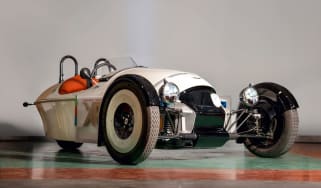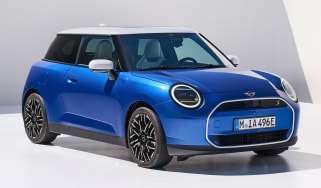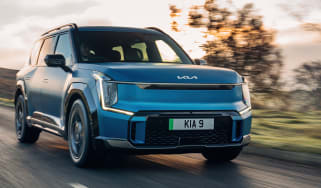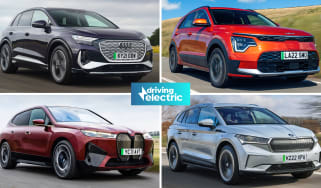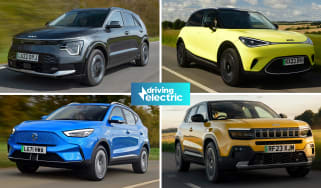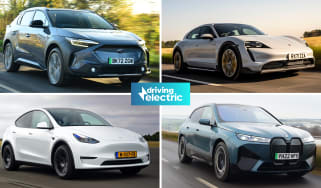Jeep Avenger review
Suitably named, the Jeep Avenger is an impressive all-rounder and seems to have saved the day for a brand stuck in the dark ages
Pros
- Circa 250-mile range
- Chunky 4x4 looks
- Surprisingly practical
Cons
- Only one mode for the regenerative braking
- Lacks performance at times
- Missing AWD at launch
| Car type | Range | Wallbox charging time | Rapid charging time |
|---|---|---|---|
| Electric | 248 miles | 7hrs 30mins (0-100%, 7.4kW) | 24mins (20-80%, 100kW) |
Jeep Avenger verdict
The Jeep Avenger has muscled its way into the small electric SUV segment looking to carve its own niche as the zero-emissions crossover of choice – suiting those wanting something that’s a little more brawny than the style-focused competition. True, the Kia Niro EV is only slightly more expensive and boasts a bigger cabin and longer range, but there’s still plenty to like about Jeep’s first EV. A comfortable driving experience and funky interior mean the Avenger is pleasant to spend time in, plus light steering makes it the perfect pick for navigating the concrete jungle. Off-road enthusiasts should wait for the forthcoming dual-motor car, but the majority of buyers will be happy with the range and performance of the surprisingly capable launch model.
Details, specs and alternatives
You know we live in a changing world when Jeep, synonymous with gas-guzzling 4x4s, has come out with a dinky, front-wheel-drive electric crossover. But the Jeep Avenger is here to stay in a growing market of small, zero-emissions SUVs that now includes the likes of the Smart #1, Kia Niro EV and Hyundai Kona Electric.
Behind the Avenger’s take on Jeep’s iconic seven-slatted grille lies a 54kWh (51kWh usable) battery, which is paired with a 154bhp electric motor. If this setup sound familiar to you, you’ll be pleased to discover the plug-in Jeep shares its e-CMP underpinnings with other EVs under the Stellantis umbrella such as the facelifted Peugeot e-2008, Vauxhall Mokka Electric and DS 3 E-Tense, as well as the new Fiat 600e.
According to Jeep, the Avenger can sprint from 0-62mph in 9.3 seconds, while those with a lighter right foot will be able to return up to 248 miles of range on a single charge. Like its Peugeot, Vauxhall, DS and Fiat siblings, the Jeep Avenger can charge at speeds of up to 100kW; find a suitable public charger and you can top-up from 20-80% in under 25 minutes.
The American off-road brand has confirmed a dual-motor, four-wheel-drive '4xe' version of the Avenger is also in the works. For now, though, buyers only have the aforementioned powertrain to choose from, as well as three trim levels: Longitude, Altitude and Summit. The cheapest version starts from around £36,000 and gets 16-inch alloys, LED headlights, climate control, rear parking sensors and a 10.25-inch central touchscreen.
We’d recommend, if you can, forking out an extra £1,700 and stepping-up to the mid-spec Altitude. This benefits from larger 17-inch wheels, a 10-inch digital instrument cluster, a faux-leather steering wheel, adaptive cruise control and a powered bootlid. Top-spec Summit models look great with their diamond-cut alloys and two-tone paint, plus they come with luxuries like part-leather upholstery, heated front seats, ambient lighting, wireless phone charging and a reversing camera. They are quite expensive, though.
Range, battery size & charging
| Battery size | Range | Wallbox charging time | Rapid charging time |
|---|---|---|---|
| 54kWh | 248 miles | 7hrs 30mins (0-100%, 7.4kW) | 24mins (20-80%, 100kW) |
Those struggling with all this new EV lingo will be pleased to know that there’s only one battery to choose from when picking which Jeep Avenger is right for you. This, the maker says, will provide a range of up to 248 miles on the combined WLTP test cycle. In reality, however, unless you’re spending all of your time driving around town at low speeds – Jeep says 342 miles is possible around town – you can expect to return slightly less; during our test, we managed to return around 4.1 miles per kWh in mixed driving conditions. This translates into a range of around 209 miles, although we suspect with a bit of a conscious effort, it should be possible to get a little closer to Jeep’s claimed figure.

As mentioned, the Jeep Avenger gets 100kW rapid charging capability as standard, just like its Stellantis sibling, the new Fiat 600e. While rivals like the Volkswagen ID.3 Pro and even the cheaper MG4 can charge faster, the Avenger’s 20-80% top-up time of 24 minutes is nothing to be sniffed at. We expect people will, most of the time, be instead utilising a much slower 7.4kW home wallbox; Jeep quotes a full charge time of around seven-and-a-half hours when plugged into one of these. The Avenger can charge at AC speeds of up to 11kW, but most homes don’t have the three-phase electrics to make the most of this.
Running costs & insurance
Jeeps have long been notorious for their thirsty petrol engines and high insurance premiums. Not so for the electric Avenger, however, as while it is rather expensive to buy, it should be pretty affordable to run. At the current average electricity rate of 30p per kWh, topping-up the Avenger at home could cost as little as £15, while using a public rapid charger would cost closer to £36 – both methods cheaper than filling up a combustion-engined SUV with petrol.
Like all electric cars, the Jeep Avenger slots into the ultra-low 2% Benefit-in-Kind tax bracket for company car drivers. Those using the Avenger as a business vehicle could be paying as little as £143 per year in company car tax, while it’s also exempt from road tax (VED). Those living in and around London will be pleased to know the electric Jeep can enter the city’s Congestion Charge and Ultra-Low Emissions (ULEZ) zones for free, as well.
Performance, motor & drive
|
0-62mph |
Top speed |
Driven wheels |
Power |
|
9.6s |
93mph |
Front |
154bhp |
At face value, 154bhp seems a pretty punchy figure for such a small car. However, EVs are notoriously heavy due to their big lithium-ion batteries so it’s no surprise the electric Jeep takes just under 10 seconds to hit 62mph from rest. This doesn’t feel as slow as you might expect, though, with the instant torque from the electric motor providing some zippiness – especially when accelerating from 0-30mph. Switching the Avenger into its ‘Eco’ mode does limit power to just 82bhp and while this is fine for around town, you really notice it on the motorway.
Out on the road, the Avenger is pretty comfortable, with only the biggest of potholes sending reverberations through the cabin. Its boxy shape does mean there’s quite a bit of wind noise, though, which is a shame as the electric motor is pretty quiet and would otherwise make long-distance travelling relatively serene.
The steering is light which makes low speed manoeuvres a breeze, but things can be firmed up somewhat by switching the Avenger into its ‘Sport’ setting – although, this also makes the throttle a little too eager for our liking. There’s only one ‘B-mode’ setting for the regenerative braking, though, and this doesn’t allow for full one-pedal driving like you’ll find in a Nissan Leaf.
One thing worth saying is that while the Avenger is ‘only’ front-wheel-drive, it’s much more capable when things get slippery than you might think. ‘Mud’, ‘Sand’ and ‘Wet’ drive modes help maintain traction down rugged country paths and lanes, while there’s even a standard-fit hill-descent control system to navigate steep declines. A 200mm ride height should help the Avenger overcome small obstacles without damage, although if that isn’t enough capability for you, as mentioned there’s a four-wheel-drive 4xe model coming in 2024.
Interior, dashboard & infotainment
Inside, the Jeep Avenger’s cabin matches the chunky aesthetic of the exterior, with plenty of easy-to-operate buttons and switches, plus some ambient lighting and body-coloured accents to brighten things up a bit. Some may find the drum-and-bass-esque indicator noises an acquired taste and there are some cheap feeling plastics about the place, but everything feels sturdy – as a Jeep should – and the high seating position gives a commanding view of the road ahead.
All versions come with a 10.25-inch central touchscreen; no model gets built-in sat nav as standard – this can be added as part of an Infotainment pack – but all cars do get Apple CarPlay and Android Auto connectivity. The system itself, while boasting rather dark and dingy graphics, is pretty straightforward and responsive to use, if lacking a bit in features. The 10-inch digital instrument cluster that comes as standard on Altitude cars and above isn’t quite as configurable as the Virtual Cockpit in an Audi Q4 e-tron, but it’s still a nice addition and we like how it changes appearance depending on which drive mode you’re in.
Boot space, seating & practicality
|
Length |
Width |
Height |
Boot space (seats up/down) |
|
4,084mm |
1,776mm |
1,528mm |
355/TBC litres |
Despite riding higher and sitting on the same platform as the Peugeot e-2008, the Jeep Avenger is actually a whopping 216mm shorter than its French cousin, making it one of the smallest cars in its class. This becomes evident in the rear seats; headroom is fine thanks to its boxy shape, but legroom is at a premium. It is possible to sit two adults in the back comfortably, but those with longer legs won’t want to be sitting there for too long.
There’s plenty of cubbyholes dotted around the cabin, although we find the iPad case-like magnetic flap on the centre console storage bin more annoying than anything else. There is no ‘frunk’ under the bonnet, but the Jeep’s 355-litre boot is a nice square shape and certainly more spacious than the Vauxhall Mokka Electric’s.
Reliability & safety rating
The Jeep Avenger is too new to have been tested by buyers for reliability, nor has it yet been given the seal of approval by safety experts, Euro NCAP. What we can say is that the electric Jeep uses a tried-and-tested powertrain that should be pretty reliable; the mechanically-similar Peugeot e-208 supermini made it onto our list of the best electric cars to own in our 2023 Driver Power customer satisfaction survey. The larger e-2008 also featured in our top-15 ranking and was also scored a strong four stars out of five for safety by Euro NCAP – not a perfect score, but safe nonetheless.

